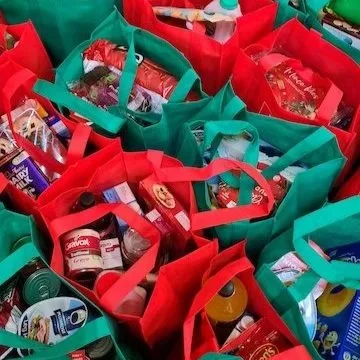Lights, Camera, Action
Imagine the set of your favorite movie: The cameras are rolling, the actors are delivering their lines, and the crew is buzzing with energy. But what happens when the director yells, "Cut!" and the day is over? For decades, top-notch, chef-prepared food was thrown away ... mountains of it.
Hillary Cohen -- a veteran assistant director on shows like Mad Men, The Office, and NCIS: Los Angeles -- has struggled over the years watching food wasted while people in her community went hungry. The common refrain was, "We can't donate it; it's a liability." But Cohen, a logistical wizard from her years in Hollywood, knew there had to be a better way.
When the COVID-19 pandemic brought the film industry to a halt, Cohen saw an opportunity. Alongside her colleague Samantha Luu, she launched "Every Day Action," a nonprofit with a simple yet powerful mission: rescue surplus food from film sets and deliver it to those in need.
According to Cohen, Every Day Action is the "GrubHub" of good deeds: "We don’t care about Martin Scorsese. We just care about your mashed potatoes."
Every Day Action created a solution that’s a win-win for everyone. The company's driver program pays production assistants and other entry-level film workers a stipend to handle the pickups. This approach not only ensures the food is handled by "set savvy" professionals but also provides much-needed income for those with unpredictable work schedules. The cycle of giving is both wise and effective: The film industry helps its own, while simultaneously helping the community. Since 2020, Every Day Action has redistributed more than 270,000 meals.
Cohen's story is a reminder that we don't have to accept the way things have always been. She saw a problem that troubled her and decided to take action. She used her unique skills and position to create a solution, turning a simple idea into a movement of generosity.
It can be easy to see the problems in our world -- the hunger, the injustice, the loneliness -- and feel overwhelmed. But like Cohen, we are each equipped with unique gifts and experiences. The question isn't whether we can solve every problem, but whether we will use what we have to help where we can.
"What good is it, my brothers and sisters, if someone claims to have faith but has no deeds? Can such faith save them? Suppose a brother or a sister is without clothes and daily food. If one of you says to them, 'Go in peace; keep warm and well fed,' but does nothing about their physical needs, what good is it? In the same way, faith by itself, if it is not accompanied by action, is dead." — James 2:14-17 (NIV)
As you consider the challenges in the world around you, where might your gifts and resources be needed? Better yet, what "mashed potatoes" can you help deliver to a person in need this week?

